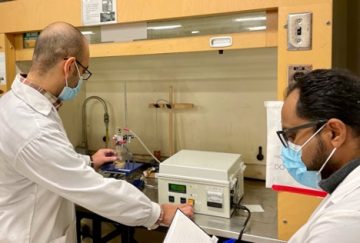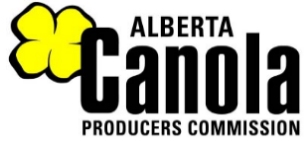



 Mycotoxins directly affect the health of human beings and animals, along with causing a huge economic loss to food/feed industries. It is estimated that 25% of agricultural commodities are contaminated with mycotoxins every year. There is no effective method currently available to eliminate the occurrence of mycotoxins in cereal grains and their products. Our lab has been testing atmospheric cold plasma (ACP) technology for its ability to reduce the number of mycotoxins (e.g., deoxynivalenol, zearalenone, T2- and HT-2 mycotoxins) affecting the cereal grains and oilseeds grown in western Canada (e.g., wheat, barley, canola, oats etc.) and identifying the various process and product factors influencing its potential. We found that ACP treatment does not affect the germination ability of seeds and it improves the germination % in certain seeds. We used both plasma activated air and plasma activated water to degrade mycotoxins in grains. Mycotoxins can be effectively degraded by ACP treatment, depending on factors including but not limited to the type of ACP treatment and mycotoxin, gas used to produce plasma, treatment time, and product. We worked with multiple industries and these projects were funded by NSERC CRD, Alberta Canola Producers Commission, and Alberta Agriculture and Forestry. ACP treatment can be successfully scaled-up independently or integrated with other conventional food processing technologies (e.g., drying, fractionation, malting, tempering etc.) for mycotoxin reduction in grains and pulses.
Mycotoxins directly affect the health of human beings and animals, along with causing a huge economic loss to food/feed industries. It is estimated that 25% of agricultural commodities are contaminated with mycotoxins every year. There is no effective method currently available to eliminate the occurrence of mycotoxins in cereal grains and their products. Our lab has been testing atmospheric cold plasma (ACP) technology for its ability to reduce the number of mycotoxins (e.g., deoxynivalenol, zearalenone, T2- and HT-2 mycotoxins) affecting the cereal grains and oilseeds grown in western Canada (e.g., wheat, barley, canola, oats etc.) and identifying the various process and product factors influencing its potential. We found that ACP treatment does not affect the germination ability of seeds and it improves the germination % in certain seeds. We used both plasma activated air and plasma activated water to degrade mycotoxins in grains. Mycotoxins can be effectively degraded by ACP treatment, depending on factors including but not limited to the type of ACP treatment and mycotoxin, gas used to produce plasma, treatment time, and product. We worked with multiple industries and these projects were funded by NSERC CRD, Alberta Canola Producers Commission, and Alberta Agriculture and Forestry. ACP treatment can be successfully scaled-up independently or integrated with other conventional food processing technologies (e.g., drying, fractionation, malting, tempering etc.) for mycotoxin reduction in grains and pulses.
Newsletter article:
- Ehsan's PhD work was highlighted in University of Alberta newsletter. Read the story here.
- Using the stuff of stars to make food safer and boost germination. More information
Manuscripts:
- Feizollahi, E., Jeganathan, B., Reiz, B., Vasanthan, T., **Roopesh, M. S. (2023). Reduction of deoxynivalenol during barley steeping in malting using plasma activated water and the determination of major degradation products. Journal of Food Engineering. More information
- Feizollahi, E., Basu, U., Fredua-Agyeman, R., Jeganathan, B., Tonoyan, L., Strelkov, S. E., Vasanthan, T., Siraki, A. G., **Roopesh, M. S. (2023). Effect of plasma activated water bubbles on Fusarium graminearum, deoxynivalenol, and germination of naturally infected barley during steeping. Toxins. 15(2), 124. More information
- *Feizollahi, & **Roopesh. M. S. Degradation of zearalenone by atmospheric cold plasma: Effect of selected process and product parameters. Food and Bioprocess Technology. More information
- *Feizollahi, E., Mirmahdi, R. S., Zoghi, A., **Roopesh. M. S., & **Vasanthan, T. Review of the anti-nutritional and beneficial qualities of phytic acid, and procedures for removing it from food products. Food Research International. More information
- *Feizollahi, E., **Roopesh. M. S. Mechanisms of deoxynivalenol (DON) degradation during different treatments: A review. Critical Reviews in Food Science and Nutrition. More information
- *Iqdiam, B., *Feizollahi, E., *Arif, M. F., Jeganathan, B., Vasanthan, T., Thilakarathna, M., & **Roopesh, M. S. Reduction of T-2 and HT-2 mycotoxins by atmospheric cold plasma and its impact on quality changes and germination of wheat grains. Journal of Food Science. More information
- *Feizollahi, E., Misra, N. N., **Roopesh, M. S. Factors influencing the antimicrobial efficacy of dielectric barrier discharge (DBD) atmospheric cold plasma (ACP) in food processing applications. Critical Reviews in Food Science and Nutrition. More information
- *Feizollahi, E., *Iqdiam, B., **Vasanthan, T., Thilakarathna, M., **Roopesh, M. S. Effect of atmospheric-pressure cold plasma treatment on deoxynivalenol degradation, quality parameters, and germination of barley grains. Applied Sciences, 10(10), 3530. More information Invited paper to the special issue “Plasma Techniques in Agriculture, Biology and Food Production” of Applied Sciences Journal.
- *Feizollahi, E., Arshad, M., *Yadav, B., Ullah, A., **Roopesh. M. S. Degradation of deoxynivalenol by atmospheric-pressure cold plasma and sequential treatments with heat and UV light. Food Engineering Reviews. Invited paper to the special issue for selected original research papers presented at the 2019 IFT NPD / EFFoST International Nonthermal Processing Workshop & Short Courses. More information
- Misra, N. N., *Yadav, B., **Roopesh, M. S., Jo, C. (2019). Cold plasma for effective fungal and mycotoxin control in foods: Mechanisms, inactivation effects and applications. Comprehensive reviews in food science and food safety, 18, 106-120. More information
Funding support:

Collaborators:
Dr. Malinda Thilakaratna (Department of AFNS, University of Alberta)
Dr. Steven Strelkov (Department of AFNS, University of Alberta)
Dr. Thava Vasanthan (Department of AFNS, University of Alberta)
Dr. Xiaonan Lu (McGill University)


